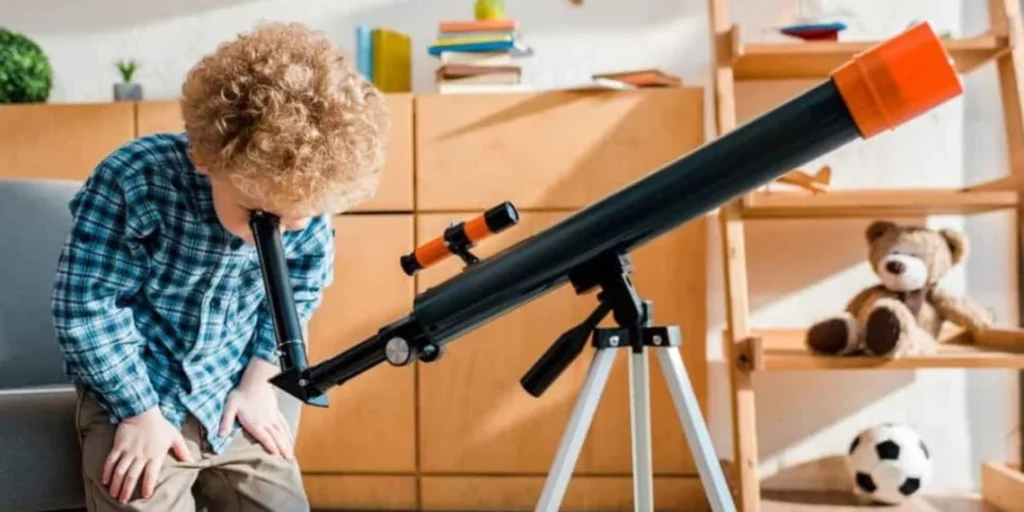The night sky is a captivating subject for both young and old, and a telescope can be a magical gateway to the universe. Introducing children to astronomy at a young age can have profound effects on their curiosity and scientific understanding. Telescopes designed for kids strike a balance between simplicity and functionality, making the experience of stargazing accessible and enjoyable.
The Celestron FirstScope Telescope is an excellent entry-level option for young astronomers, offering a compact design and easy setup. The Orion 10012 SkyScanner Telescope is another great choice, offering a 100mm aperture and a focal length of 400mm. The Educational Insights GeoSafari Jr. My First Telescope is a fantastic introduction to stargazing, providing 10x magnification with a focus knob that’s easy for little hands to manipulate. The Celestron AstroMaster 70AZ Telescope is suitable for slightly older kids and teenagers, offering clear views of the moon, planets, and some deep-sky objects. The AWB OneSky Reflector Telescope is a portable and affordable option that caters to both beginners and young astronomers.
Choosing the right telescope for a young astronomer involves considering aperture, portability, ease of use, and durability. By fostering a love for astronomy at an early age, we empower the next generation to reach for the stars and unravel the secrets of the cosmos.
Why Start Early?
Introducing kids to astronomy at a young age can have profound effects on their curiosity and scientific understanding. It not only fosters an appreciation for science but also encourages critical thinking and problem-solving skills. Telescopes designed for kids strike a balance between simplicity and functionality, making the experience of stargazing accessible and enjoyable.
1. Celestron FirstScope Telescope
The Celestron FirstScope Telescope is an excellent entry-level option for young astronomers. Its compact design and easy setup make it perfect for beginners. Featuring a 76mm aperture and a focal length of 300mm, this tabletop telescope provides clear views of the moon, planets, and bright celestial objects. Its simplicity and user-friendly design make it an ideal choice for kids eager to explore the cosmos.
2. Orion 10012 SkyScanner Telescope
The Orion 10012 SkyScanner Telescope is another great choice for budding astronomers. With a 100mm aperture and a focal length of 400mm, it offers impressive views of the moon, planets, and even some deep-sky objects. The tabletop design provides stability, and the uncomplicated manual altazimuth mount allows for easy navigation across the night sky. This telescope is designed to be user-friendly and encourages hands-on exploration.
3. Educational Insights GeoSafari Jr. My First Telescope
For the youngest aspiring astronomers, the Educational Insights GeoSafari Jr. My First Telescope is a fantastic introduction to stargazing. Geared towards preschoolers and early elementary-age children, this telescope provides 10x magnification with a focus knob that’s easy for little hands to manipulate. The sturdy construction ensures durability, making it a perfect choice for the curious minds of the youngest astronomers.
4. Celestron AstroMaster 70AZ Telescope
Stepping up in terms of features and capabilities, the Celestron AstroMaster 70AZ Telescope is suitable for slightly older kids and teenagers. With a 70mm aperture and a 900mm focal length, this refractor telescope offers clear views of the moon, planets, and some deep-sky objects. The Altazimuth mount makes it easy to navigate the night sky, and the included accessories, such as eyepieces and a star pointer, enhance the overall observing experience.
5. AWB OneSky Reflector Telescope
The Astronomers Without Borders (AWB) OneSky Reflector Telescope is a portable and affordable option that caters to both beginners and young astronomers. With a 130mm aperture and a focal length of 650mm, this tabletop telescope provides impressive views of celestial objects. The collapsible design makes it easy to transport, and the simplicity of use encourages kids to take their telescope on various stargazing adventures.
Tips for Choosing the Right Telescope
When selecting a telescope for a young astronomer, consider the following factors:
Aperture: A larger aperture allows more light to enter the telescope, resulting in clearer and more detailed views. However, larger apertures can also make the telescope bulkier and more challenging to handle.
Portability: Consider the size and weight of the telescope, especially if it will be used by a child. Telescopes that are easy to transport encourage outdoor exploration.
Ease of Use: Look for telescopes with user-friendly designs and straightforward assembly. Telescopes that are too complex may discourage young astronomers.
Durability: Kids can be rough on their belongings, so choose a telescope that is built to withstand some wear and tear. Sturdy construction ensures a longer lifespan for the telescope.
Conclusion
Introducing kids to the wonders of the cosmos through a telescope can be a transformative experience. Whether observing the phases of the moon, the rings of Saturn, or distant galaxies, a telescope opens a portal to the mysteries of the universe. The telescopes mentioned above are excellent choices for young astronomers, offering a balance of simplicity, functionality, and affordability. By fostering a love for astronomy at an early age, we empower the next generation to reach for the stars and unravel the secrets of the cosmos.







